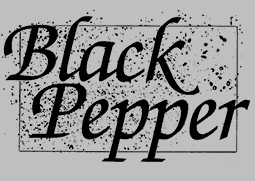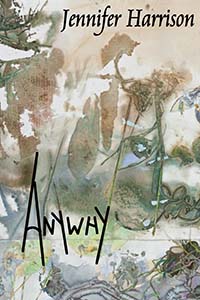 |
Anywhy : Jennifer Harrison |
|||

Book Description If birds could fly free from ornithological books and from watercolour illustrations if they could fly free from taxidermy agitated aviaries and roseate oil paintings they’d leave us more earth-bound than ever before but we might find a way to rise with them transmogrified and see for ourselves their world of ultraviolet night Like the great grey owl, we might hear the scratchings of a mouse running under deep snow Jennifer Harrison’s Anywhy
is exceptional. The depth and lightly carried learning of the author,
as we embrace each poem, is startling. We are philosophically shaken.
Her title Anywhy may suggest
the cool shrug of ‘whatever’ but Harrison’s neologism is a steady-eyed
consideration of the world: its ecology, its history, its fragilities
and resilience. Her insight is subtle but never vague, inviting our
imagination to consider the inner life of birds, the emotive pull of
hardware, Emma Hamilton, a reverie at Blackwood Village (from which the
title emerges), DNA or Absolute Zero. Above all, it scintillates with
human sorrow and human response. Harrison is a challenging and significant poet, the quality of whose work needs defining and celebrating. Martin Duwell With
its subtle but inventive lyrical strategies and masks, poetry like
Jennifer Harrison’s addresses poetry—which means it addresses us,
quietly, as readers who enter its space as observers and who are
active, and who feel its presence within us, not in our faces. Philip Salom ISBN 9781876044190 Published 2018 96 pgs |
||||
| Book
Sample Provence July 2014 Avignon’s back door: an errant bus circling the outer suburbs of dilapidated houses mosques, polite parks, pallid churches… Then, the City of Popes grand square Cathédrale Notre-Dame des Doms d’Avignon its gilded statue of the Virgin Mary singing solitary in the sun… The square is waiting for its people microphones, une marche de protestation a rally for equitable actors’ wages (politics arriving now, a trumpet blowing)… I cannot fathom the brass speeches but wave the flag I’m given… In my pocket an Australian two-cent coin, the frill-neck lizard embossed into its coppery sheen… I remember a school project— the lizard basking in grassland sun drawing from midday warmth its sleepy torpor—how the lizard’s frill prickles, erectile under threat: ancient spines, cartilage deimatic… And here in unfamiliar side streets cafés pungent with liberal tobacco red wine and pastry filigree the scent of the night-to-be hovers over music and theatre poverty… What threat can there be? What trepidation catches inside me somewhere primitive and old, somewhere deep inside a poikilotherm’s unseen cold? Fungi Life spools backwards now the expanse behind damp and forest-quiet peaty with leaf mulch translucent moss greens mushrooms like white ghosts and neon species of orchids, wasps… Nothing is undone by decay, ants, slugs rotting logs, stag ferns the accretions of wet bark and litter… Nothing is spoiled or lightly regretted… Fungi yellow with age, autodigest spilling black droplets on a page of earth or paper, forests unevenly inked as though hopeful of spore coming late to the poem’s terrain… A slight mist lifts, falls all evening: the un-nesting voice of Luce Irigaray veiled without within the heart does not lack a dwelling fugue words lingering in time’s ‘meanwhile’… Flock-wise, fungi feed on the living wood of the past, pale cups swaying toughly on blithe stems cinnamon gills, poised in breath, delicate… Night pins my speciesharrisona.html#HomerRiethReadsAnywhy to essence, to tasks of the sleeping word and like a rough leaf released by autumn I settle into presence, the desk now impractically a diminution… There is no ending to shadow, to the nature that explains us to the deep earth and earth to our past— our present poison Absolute Zero After ice covered the world, the sun melted aeons of cold into the sea… The shore recalibrated… Mammoths disappeared… Explorers etched a path to the poles leaving a scar of tents… Ice closed in upon itself, clenching a fist each end of the globe until day and night were balanced, acquiesced to moon and sun… The planet’s lungs drew breath and sighed again… Helium became a superfluid, able to climb walls of glass against gravity… Then quantum theory, the laser beam… And still the earth flinches back from the Absolute… Tears unfreeze and fire learns—but the last blue dream of winter is a private tundra so cold that even if we conquered Mars we’d need a new Zero, ungraspable, unknown |
||||
Book Launch | ||||
Launch Speech by poet Alex Skovron 6 December 2018 North Fitzroy Arms Hotel The Anywhy book launch speech presented by Alex Skovron may be read using the link below. | ||||
Reviews | ||||
No neat narratives in our dark times By SARAH HOLLAND-BATT 3:00PM SEPTEMBER 11, 2020 Whenever there’s a catastrophic turn in the news cycle, Bertolt Brecht’s harrowing, defiant poem, Motto, inevitably goes viral on social media. Brecht wrote the poem in exile from Germany on the Danish island of Funen in the late 1930s. Contemplating the horrors of Nazism, he wrote: “In the dark times, / Will there also be singing? / Yes, there will be singing / About the dark times”. Brecht’s poem speaks of the urgency of witness — through art and literature — as both a bulwark against forgetting, but also as a form of resistance. Brecht’s imperative to “sing” is often contrasted with the statement made by Theodore Adorno after World War II — that to write poetry after Auschwitz is barbaric — frequently interpreted to mean that art is fundamentally inadequate to contend with the horrors of history, or is even, at times, complicit in them. Yet, despite the challenges inherent in finding a language for the extremities of human depravity, an indelible and powerful poetry of witness did emerge from the Holocaust, written by both survivors and victims: among them Paul Celan, Miklós Radnóti, Primo Levi, Nelly Sachs and Tadeusz Borowski. The poetry of witness was once mostly written by those who experienced events or suffering first-hand. Yet in the 21st century, witness is no longer delimited to those with first-hand experience. The ubiquity of photojournalism and the rise of the internet mean we all have daily contact with horrors distant and local. Suffering is beamed into our homes on screens with unparalleled immediacy. It’s debatable whether this continuous contact with suffering fosters empathy or apathy in the viewer. Susan Sontag famously argued that photography does “as much to deaden conscience as to arouse it”. Poets in our interconnected era now face the question of what to do with their knowledge of global suffering. How can poetry grapple with the constant siege of televisual violence? How can poets witness the unspeakable? This week’s poet, Jennifer Harrison, engages in complex ways with this problem of the representation of violence in her seventh volume, Anywhy (Black Pepper). Harrison is a psychologist as well as a poet. Her work has gravitated towards scientific and medical subjects, an interest that continues in this latest volume, where there are poems about autopsies and anatomy, the growth cycles of fungi, the workings of DNA, which the poet describes as the future / coiled like a hair in a drawer, and the pseudoscience of phrenology. At the core of Anywhy is a cluster of poems concerned with the representation of violence in photography, film and art, and the fraught question of how the poet can act as a witness to the suffering of others. In the pantoum Photograph by Walker Evans, 1937, Harrison considers Evans’s most famous photograph of the Great Depression, Alabama Tenant Farmer Wife, in which an impoverished sharecropper’s wife, Allie Mae Burroughs, stares into the lens with a hard-bitten expression, a young woman in a floral dress, eyes like nailed wood, Harrison writes, who looks as if she has drunk all the dust poverty distils. Harrison’s poem underscores how much of Burroughs’s life is excluded from the camera’s gaze; the viewer cannot see what she cannot have nor her private thoughts. Her voice in the image, Harrison writes, is shy. Likewise, in the sequence War Photography and the Minaret of Umayyad, Harrison again grapples with the representation of conflict in photography, painting and film, ranging from Syria to Botswana, Hiroshima, the Gaza Strip and Afghanistan. She begins with an image of a lion standing in a grass savannah, “claws searching / the fields of corpses / for weapons and gold” — a symbol, perhaps, for war’s voraciousness — before turning to photographer Shomei Tomatsu’s images of Hiroshima survivors avoiding light / as if to practise being seen; the spectre of Hitler on SBS” who rises / from the future / of guilt and Ben Quilty’s paintings of soldiers on tour in Afghanistan: See? here we are with them, Harrison writes of Quilty’s soldiers, with everything // that is not yet / vague with distance. This last phrase seems key: while photos, films and visual art give the illusion of bringing the viewer into contact with suffering, Harrison implies that ultimately this proximity is a mirage; they are afterimages, ambiguous and vague with distance. As a whole, the War Photography sequence echoes criticisms made by Sontag and others of the photography of suffering: that such images risk inuring the viewer to suffering, and that they have the capacity to misrepresent history, given that they place such an emphasis on a singular moment and perspective. When witnessing these conflicts, Harrison suggests, our gaze is always already mediated through the photographer’s lens; there can be no such thing as objective witnessing, only a piecemeal understanding. In this week’s poem, Door 1, excerpted from a longer sequence called Nine Doors: A Curriculum of Rune Work, Harrison grapples with another act of violence, one that unfolded closer to home and was seared into the public consciousness: the 2012 murder of Gillian Meagher, which took place eight years ago this week. The details of Meagher’s horrific, senseless murder played out in gratuitous, sensationalised detail in the media; her Facebook profile picture and CCTV footage of her last movements continuously looped on every channel, and became archetypal, inextricable from the way the public understood her life and her death. Harrison’s elegy approaches Meagher’s violent murder at an angle, beginning as the poet watches the film Aliens on television, as Sigourney Weaver’s protagonist, Ripley, claws her way / through a derelict spaceship and fights for the child to survive. As the poem unfolds, you’ll notice that Harrison flickers between the cinematic and the real: the dystopian imagery of deep space on screen merges with the night / now thick as a closed fist in Brunswick. As the movie continues, the poet imagines dialogue that doesn’t seem to belong to the film, but rather to an internal monologue she is having while home alone / in safe-roomed - entombment. There’s an implicit juxtaposition between the security and sanctity of the poet’s home with that kind of dark. Wisely, Harrison doesn’t dwell on any of the details broadcast about Meagher’s death; her anguish mostly unfolds in the silences that interrupt her viewing of the movie. No neat narratives in our dark times 1/10/20, 10:51 am The neat resolutions to crime on the television — where murder resolves itself through incremental clues — is juxtaposed with the haunting, recurring image of girls in the real world, walking home / as they always have / and will. In this final, unbearable image, Harrison imagines Meagher’s death as part of a continuum of violence against women, one that cannot be resolved into neat narratives or totalising visions, but which requires a continuous, wrenching reckoning. In all the silences of Harrison’s poem, we find a poet who understands that the poetry of witness is sometimes all the more powerful when it acknowledges what cannot be known or said.
Door 1
i.m. Gillian ‘Jil’ Meagher (1982–-2012) night
a ceremony offering
up its movie aliens Ripley clawing her way through a derelict
spaceship blasting the creature to
bits as she swipes her gun around the corners of
space and
fights for the child to survive Get away from her you bitch that’s what you want to
say to the night now thick as a closed
fist back
rubbish streets Brunswick alleys where
girls should walk alone
if they want to yet
shouldn’t walk
there at all
not
safely in
that kind of dark daughter
out there outside
the spaceship ‘what
am I supposed to do—stay indoors every night?’ she
asks not
blaming/not sure/ she
will not be written out buried at home alone in safe-roomed
entombment where
murder resolves itself through incremental clues like
an episode of Waking the Dead meanwhile the
girls are walking home as
they always have and will they weigh
the feather and stone in
one hand then
the other and
find them equally light.  At the height of her powers David McCooey reviews Anywhy by Jennifer Harrison Australian Book Review, November 2018, no. 406 Jennifer Harrison’s new collection, Anywhy, is concerned with the dynamic between light and dark, self and other. Harrison has a deep concern for non-human animals. ‘The Animals’, about the burning of the Warsaw Zoo during World War II, is a particularly harrowing example of this concern. Harrison illustrates a post-Romantic interest in the natural world, but here there is a more explicit acknowledgment of the Anthropocene that we have brought into being. Harrison, who is also a psychologist, habitually incorporates putatively non-poetic registers – especially scientific discourse – in her poetry. She is notably wide-ranging in her interests. Poems in Anywhy cover ancient history and archeology, war, photography, suburbia, birdlife, and so on. A number of poems are ekphrastic in nature, which is to say they respond to other works of art, such as a famous photograph by Walker Evans. This is not to say that Harrison’s poetry is merely random in its concerns. It has a number of unifying features. The neologistic title of Anywhy illustrates Harrison’s love of linguistic play. There are, for instance, two ‘Air Variations’ that employ words with particular initial letters (C and D, and L and M, respectively) to produce a rich musicality, even as they cast a characteristically cool eye over the world. In ‘DNA’, various versions of that famous abbreviation illustrate Harrison’s serio-comic inventiveness: ‘Developmental Needs Analysis / Digital Network Architecture / Do Not Abbreviate’. As these poems illustrate, Harrison can allow the comic and the elegiac to occupy the same poetic space. In the apparently self-elegiac poem ‘The Exchange, Blackwood Village’, the poet meditates on life after cancer: ‘Death found my measure in its pill of greed / and I carry the taste inside like a baby, never to birth.’ Ultimately, with its emphasis on different types of media and discourses, Harrison seems to be concerned with representation itself, and with representation as something that takes in both sympathy and violence. When she quotes the Hungarian war photographer Robert Capa – ‘if the photograph is not good enough / you aren’t close enough’ – one gets the sense that she is offering a description of her own poetics. Harrison is a poet of close-up photography, anatomy, and intensity, and this latest collection shows her to be at the height of her powers. David McCooey is a prize-winning poet and critic. | ||||
Inspiring range of ingenuity Geoff Page reviews Anywhy by Jennifer Harrison Weekend Australian, August 11-12, 2018 Jennifer Harrison, also from Melbourne, is a poet of comparable stature to Jordie Albiston. Since Michelangelo's Prisoners (1996), Harrison's collections have been wide-ranging in concerns and formal resources. Her new book, Anywhy (Black Pepper, 78pp, $24), may well be her best so far. At times hermetic, at others confessional, Anywhy leaves the attentive reader plenty of space to move in, enjoying the verbal music for its own sake, while also at other times making important, even insistent, points about human nature and the natural world with a memorable directness. A fine example of the former is Seeker after Smooth Things, which is short enough to quote in full. “It’s quiet now — that time of night / when children sleep / and you have stolen from their dreams / this small arc of solitude... // The night untitled, untidy / a seeker after smooth things: / a crumb brushed, a fragment thought / an echo of silence / more silent than silence.” The ending is almost a Zen koan and nicely wraps up what is, in one sense, an exercise in alliteration and assonance. Many questions remain and yet we are not frustrated. What does an “arc of solitude” look like? Has there ever been a night that was “titled”? Is “thought” a verb or a noun here? What exactly is inside those “smooth things” sought out by the personified “night”? Emma Hamilton: a Postcard is a very different sort of poem. Hamilton, Lord Nelson’s Mistress, is at once “a tourist / sitting on a hotel balcony overlooking the Port of Naples" in the1790s and an observer of the nuclear-powered aircraft carrier USS Dwight Eisenhower in that same bay a couple of centuries on. After a deft comparison between Vesuvius and a nuclear holocaust, Harrison finishes with an unforgettable couplet: “Emma remembers those she loved and for what reason... / Horatio Nelson remembers those he killed, and why” Point made. A group of similarly powerful poems includes Cuttlefish, The Inner Life of Birds, Possum and Gnidarian. Though each is very different, all four are conservationist in intent and remind us what can (or will) be lost through our disregard of creatures that escape our notice or concern. In each case, Harrison employs extensive personification, which would normally risk sentimentality. She begins Cuttlefish by talking about the animal “squint(ing) an inky cloud, the prudish veil / of a storybook widow we might read /about in Dickens”. By the end, however, we readers are more than aware that we too are likely to share the fate of this strangely beautiful creature “hoovering shrimp with her parrot beak, jaws // and raspy tongue”, who “chas(es) down divers for company //... as if we too live only a few years / out there beyond the day’s dazzle in moody / crevices in the middle of False Bay". Geoff Page is a poet and critic. | ||||
Homer Rieth reads Anywhy by Jennifer Harrison Your package has arrived: And what a nice surprise to find a copy of Jennifer's latest work, which I've already read through from start to finish. I'll tell you frankly, there's nary a poem that doesn't draw you immediately into its inner circle, or make you catch your breath with words and images no amount of anticipation can prepare you for. The animal kingdom poems are especially strong, Cnidarian, Possums, Animal Mummies and Cuttlefish, the last of these, well, just magnificent, a high water mark. May I sing the praises also of Movie Night, The Exchange, The Anatomy Room and Seven Phrasings for Sumi Jo, all of them most impressive. Only in Sanatorium 1926, at the penultimate line, in the phrase 'hiemal sun' might one wish for a plainer, less attenuated adjective, in a volume rich in the purity of its diction. I might add that I had no trouble rembering the majestiemc fugue-like Ideas of Shore, and how only a whisker separated it from the judge's salute in 2014! It appears to be a bit leaner, and is a poem of great style, eloquent and beautifully controlled. Even as it leads you to that shore, you feel that somehow it is taking you into an emotional hinterland, of great moment to both writer and reader, in ways they are only beginning to understand. The last poem in a slim volume, it has been said, is a gauge of its artistry, its poetical troy weight. On this reckoning, Anywhy's last poem, The Tent, leaves most other such end pieces that I can think of, for dead. It's a ripper of a poem. |
